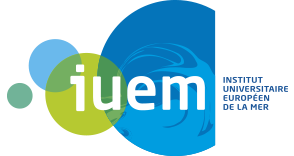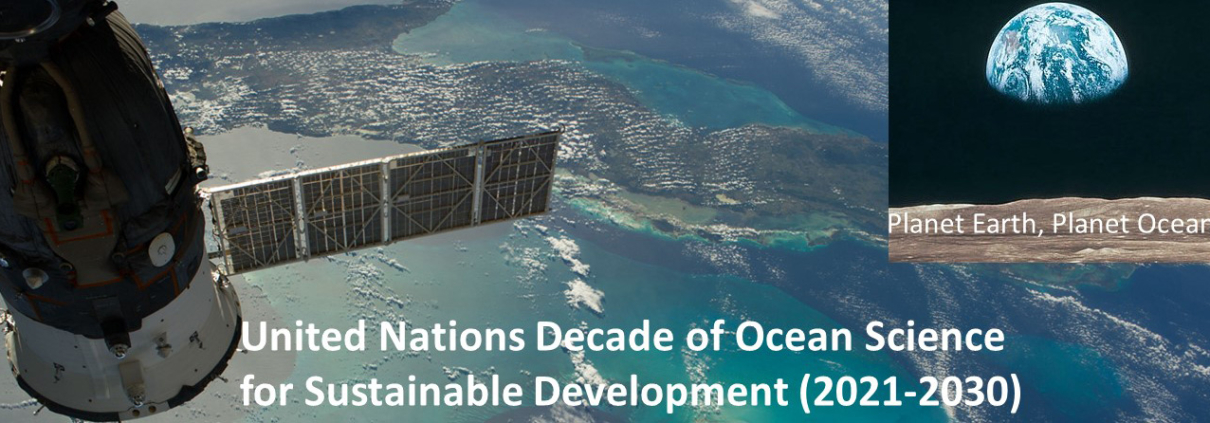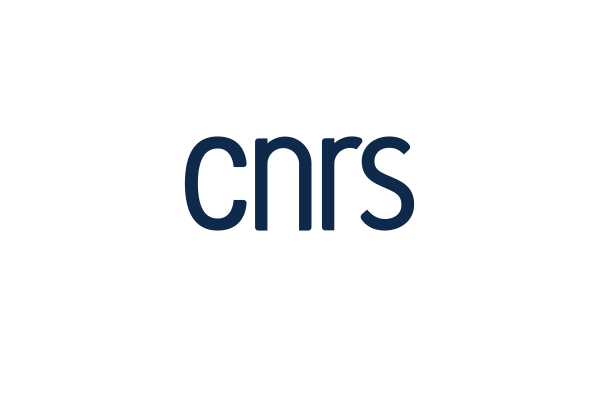Frontier Forum Chine-Europe sur les progrès des sciences et technologies océaniques
L’Académie chinoise des sciences (CAS) et l’Académie européenne des sciences (EurASc) ont organisé le Frontier Forum Chine-Europe sur les progrès des sciences et technologies océaniques les 28 et 29 septembre 2022 en association avec l’IUEM.
Résumé
Le deuxième Frontier Forum Chine-Europe s’est tenu dans le cadre de la décennie des Nations Unies pour l’océan au service du développement durable (2021-2030). Environ 300 participants y ont assisté. Vingt intervenants invités ont présenté des communications sur les actions climatiques basées sur l’océan, la gestion des Big Data, les jumeaux numériques de l’océan et l’océan côtier global. Ce Forum montre d’abord que l’océan offre de nombreuses possibilités (notamment les énergies renouvelables, le captage et le stockage du dioxyde de carbone et les émissions négatives de gaz carbonique) pour réduire les causes et les conséquences du changement climatique, à l’échelle mondiale et locale. Il met également en lumière les développements récents et spectaculaires de la technologie et des instruments d’observation de l’océan qui ont modifié notre capacité à visualiser l’ensemble de l’océan avec des « Big-Data » en termes de quantité et de qualité, qui constituent la pierre angulaire d’applications telles que l’interpolation optimale (IO) et l’intelligence artificielle (IA). Il démontre ensuite l’intérêt considérable et le large éventail d’efforts et d’intérêts internationaux pour faire avancer les jumeaux numériques de l’océan. Enfin, il illustre la puissance du concept émergent d’océan côtier global avec le développement de nombreux outils numériques pour aider les décideurs.
Recommandations : 1- soutenir la création d’IPOS (International Panel for Ocean Sustainability) dont le rôle est de fournir des conseils scientifiques consensuels aux décideurs et aux gouvernements sur la durabilité des océans 2- organiser un 3ème Forum Frontière CAS – EurASc en Chine en 2024.
Synthetic report
Executive summary. The second China–Europe Frontier Forum on “Progress in Ocean Science and Technology” (FFPOST2) held on line on 28-29 September 2022 in the framework of the UN decade of Ocean Science for Sustainable Development (2021-2030). About 300 participants attended. Twenty invited speakers presented communications on ocean-based climate actions, Big data management, Digital Twins of the Ocean, and the Global Costal Ocean. This Forum first shows that the ocean offers numerous opportunities (including renewable energy, carbon dioxide capture and storage, and negative emissions) to reduce the causes and consequences of climate change, globally and locally. It also highlights the recent and spectacular developments of ocean observing technology and instrumentation that have changed our ability to view the entire ocean with « Big-Data » in terms of quantity and quality, which forms the base-stone of applications such as Optimal Interpolation (OI) and Artificial Intelligence (AI). It then demonstrates the tremendous interest and the wide range of international efforts and interest to push forward Digital Twins of the Ocean. Finally, it illustrates how powerful is the emerging Global Coastal Ocean concept with the development of many numeric tools as a help for decision-makers.
Recommendations: 1- to support the creation of IPOS (International Panel for Ocean Sustainability) the role of which is to provide consensus-based scientific advice to decision-makers and political processes on ocean sustainability. 2- to organize a 3rd CAS – EurASc Frontier Forum in China in 2024.
Major conclusions of the Frontier Forum:
Ocean-based climate actions, session chaired by Paul Tréguer (IUEM-UBO, France) and Jing Zhang (ECNU, China). Speakers: Jean-Pierre Gattuso (CNRS, France) and Nianzhi Jiao (Xiamen University, China). The ocean offers numerous opportunities (including renewable energy and carbon dioxide capture and storage) to reduce the causes and consequences of climate change, globally and locally. Ocean-related measures should not be considered as a substitute for climate mitigation on land or non ocean-based adaptation measures. Developing ideas of ocean solutions and persuade activities to adapt the climate variability needs joint efforts of different countries and to keep in mind the International Laws of Sea (e.g. High Seas). Any action will impact the society and life of millions of people from different parts of this world. Ocean science, observation, environmental monitoring and prediction are vital for evidence-based action to protect and sustainably manage the ocean. But there are still too many gaps in our knowledge of the ocean. Actions and solutions to the ocean health crisis depend on our level of knowledge, understanding and capacity to innovate. This is the reason why we support the creation of IPOS. In this regard, the Monaco Ocean Week and the Xiamen Ocean Week could be good examples in practice, and the two could be linked as sister IPOS outreach.
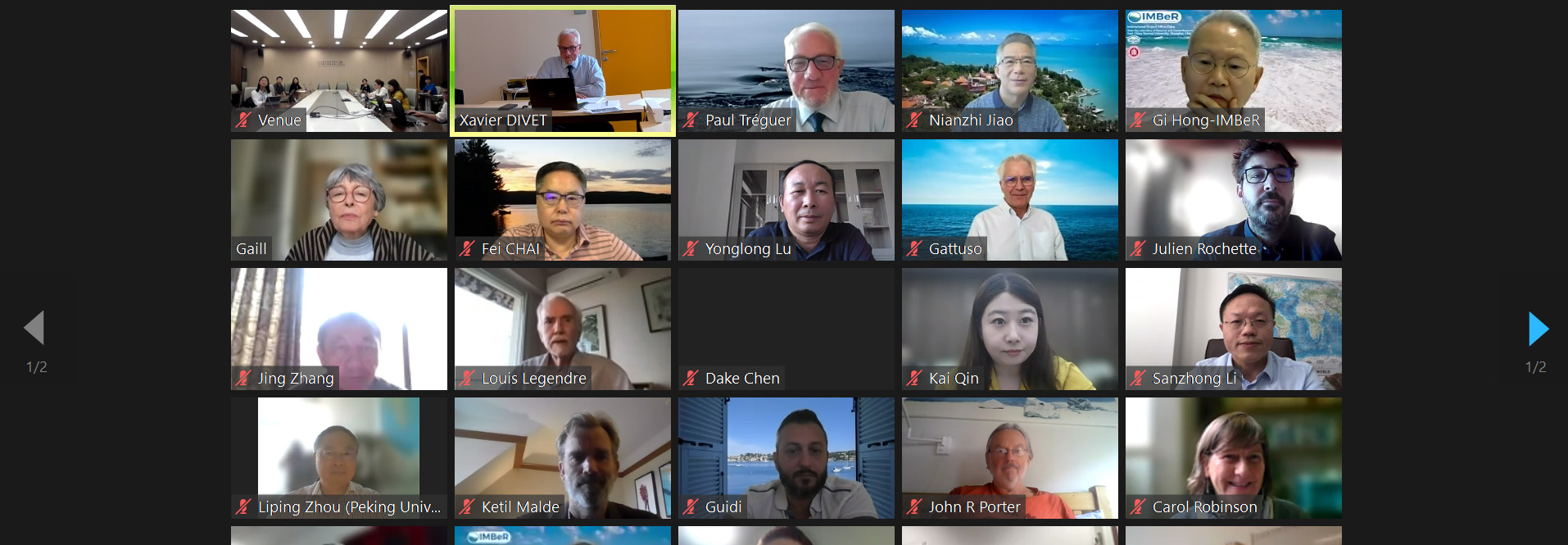
Big data management for ocean science and technology, session chaired by Lionel Guidi (CNRS, France) and Huadong Guo (IRC of Big Data for Sustainable Developments Goals and AIRI/CAS, China). Speakers: Damien Eveillard (U. Nantes, France), Huadong Guo, Ketil Malde (U. Bergen, Norway), Xiaofeng Li (IO/CAS, China), Pierre Tandeo (IMT Atlantique, France), Ge Chen (Qingdao NLMST, China). With an explosion of data, the 21st century corresponds to a new step of the development of ocean science and technology. « Big-Data » is supported by the technology in ocean sciences. The recent developments of ocean observing technology and instrumentation have changed our ability to view the entire ocean with « Big-Data » in terms of quantity and quality, which forms the base-stone of applications, such as OI and AI. Regarding biology, recent progress in metagenomics has promoted a paradigm change to investigate microbial ecosystems. Environmental and metagenomic data can improve our understanding of biological processes such as carbon export. Using a model of extensive omics knowledge via constraint programming allows a definition of the ecological concept, such as the niche of organisms. Progress has been made regarding the big Earth data’s value and potential for applications in monitoring and evaluating the marine pollution, ocean acidification, marine ecosystem health management related to SDG 14. Regarding fisheries management we are now training and deploying deep learning models to automatically analyze data and identify species of interest from acoustics and images. Progress has been made regarding the coastal zone information retrieval from satellite synthetic aperture radar (SAR). The Google Cloud Platform allows large oceanographic data sets, coming from in situ and satellite reanalysis, as well as climate simulations coming from CMIP (Coupled Model Intercomparison Project). Novel and rigourous artificial intelligence (AI) methodologies are now employed to process and analyze ocean big data to improve our understanding of marine ecosystems.
Digital Twins of the Ocean component of the Digital Earth Initiatives: session chaired by Martin Visbeck (GEOMAR, Germany) and Dake Chen (SIO, China). Speakers: Martin Visbeck, Dake Chen, Pierre Bahurel (Mercator International, France), Fei Chai (Xiamen U., China), Isabel Susa Pinto (U. Porto, Portugal), Fangli Qiao (FIO, China). The presentations have demonstrated that there is tremendous interest and a wide range of international efforts and interest to push forward Digital Twins of the Ocean. DTOs are able to answer critical ‘What if’ questions and thus can help optimize societal interventions addressing global environmental human-ocean but also social challenges, e.g. pollution, sustainable fisheries, protection management. There is a lot of infrastructure already in place that can be used for creating DTOs (e.g. GOOS and IODE internationally, Copernicus EMODnet Blue Cloud at the EU level), focus must be placed on bringing together and harmonizing this data to create a comprehensive, user-friendly DTO application. A range of research institutes and government actions are supporting the implementation of DTOs. There is political momentum (UN Decade of Ocean Science for Sustainable Development, G7, One Ocean Summit and many more). However, fully entraining all actors including the private sector and lawmakers will need financial incentives to join DTO projects. To be noted: the next DITTO conference will be help in Xiamen in November 2023.
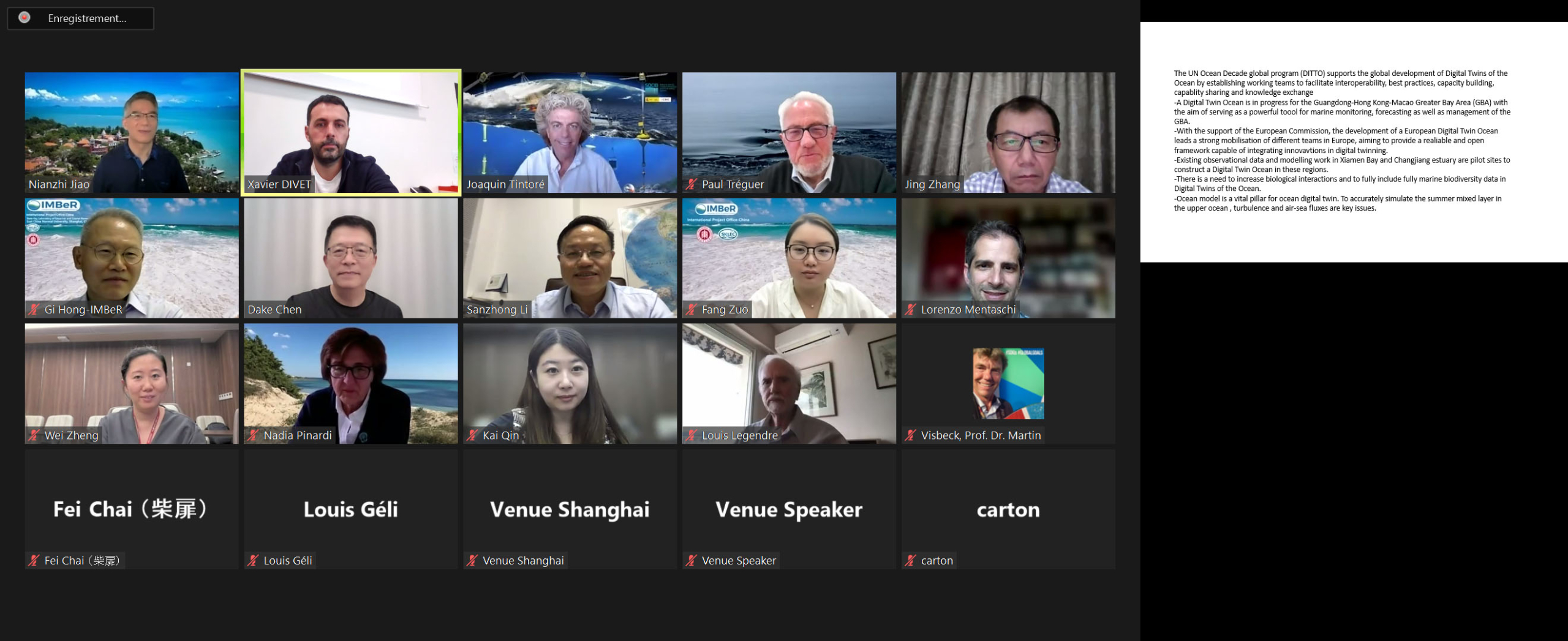
The Global Coastal Ocean: session chaired by Nadia Pinardi (UNIBO, Italy) and Nianzhi Jiao (Xiamen U., China). Speakers: Nadia Pinardi, Nianzhi Jiao, Joaquin Tintore (SOCIB, Spain), Sanzhong Li (OUC, China), Lorenzo Mentaschi (UNIBO, Italy), Yonglong Lv (Xiamen U., China). The UN Decade Program CoastPredict considers all coastal regions as an interface area. GOOS and CoastPredict will provide (1) accurate descriptions of the present state of the coastal oceans, (2) continuous forecasts of the future coastal ocean conditions, (3) basis for predictions of climate change impacts. The UN decade program Global Ocean Negative Carbon Emissions (Global-ONCE) based on integrated BCP-CCP-MCP mechanisms include land-ocean integrated management, artificial upwelling in aquaculture areas, and wastewater outflow alkalinity enhancement, which will provide demonstrations in representative environments. SOCIB (Balearic islands multi-platform observing a forecasting system) for the western Mediterranean seas aims to provide tools for decision support, products and services for ocean and climate change, ocean health, and real-time services. The geological carbon pump concept includes all geological time-scales (from weeks to hundreds of millions of year) processes on the Earth surface and in the Earth interior that cause organic or/and inorganic carbon dioxide sequestration. The ongoing climate change is expected to drive increasing extreme sea levels (ESLs) along our coasts. Coastal ecosystem health is of vital importance to human well-being. Field investigations of major pollutants (e.g. PFAAs, PPCPs, metals…) along the whole coast of China have been reported.
Acknowledgements: The conveners and participants thank the Earth Sciences Division of CAS, the Division of Earth and Environmental Sciences of EurASc, and the European Institute for Marine Studies (IUEM) of the University of Brest (UBO), for their support to organize this workshop.
Crédit photos
NASA
Xavier Divet / UBO
Contacts
Paul Tréguer / UBO
